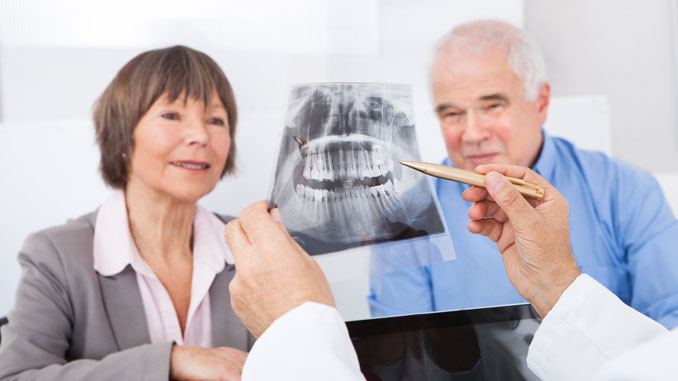
As we age, our bones lose density and become more brittle.
It’s also not uncommon to get sick more often and stay sicker for longer. Oral health is no different than any other physical health conditions for seniors; being older simply increases risk.
But what oral issues should seniors be most concerned about? Anything that threatens overall health is especially concerning. For example, teeth that are not well cared for become subject to tooth and root decay, thrush, and gum disease that can lead to tooth loss and an uneven jaw bone. Advanced gum disease has been linked to cardiovascular problems, a family of conditions that seniors are already more susceptible to, and other health ailments that affect the whole body—not just the mouth.
Routine Visits
The best way to avoid serious oral ailments is to stay up to date on checkups. All adults should be seeing a dentist once every six months for a routine cleaning and exam. Those with early stages of gum disease may benefit from quarterly cleanings instead. Seniors should also schedule an appointment anytime they feel pain in the gums, teeth, or another area of the mouth.
Sometimes serious oral health conditions show up with little to no warning signs, meaning if you aren’t seeing a dentist often, you could be missing a gingivitis diagnosis or even cavities. Mouth cancer is known for having very few, if any, symptoms at first so only a dentist might catch it, and once adults hit about 60 years old they enter a second round of cavity-prone years, which could mean a person who rarely had cavities before is now at increased risk of developing them even without a change in hygiene habits.
Overall Health Affects Teeth
If you suffer from other ailments, as most people in their 60s and beyond do, you could be at risk for poor oral health. For example, those with diabetes are more likely to develop gum disease, which can lead to tooth decay and even tooth loss.
Another culprit is dry mouth, a seemingly mild issue that can increase the risk for cavities. The worst part? Many medications for a wide range of conditions list dry mouth as a common side effect, so if you take medications for another health issue, you’re more likely to suffer from the negative effects of dry mouth, too.
Seniors with osteoporosis are especially susceptible to periodontal disease, tooth loss, and issues with the jawbone because the ailment affects the bones. Aging, menopause, and lack of vitamin D and calcium all increase a person’s risk of developing osteoporosis and while you can’t avoid the first two, eating a diet that includes adequate amounts of vitamin D and calcium may help.
Dentures
Every year it seems the number of people maintaining natural teeth is going up. With that said, many seniors do still rely on partial or full dentures at some point in their life, and taking care of those dentures is as vital as caring for natural teeth.
Having dentures doesn’t mean a patient can forgo dental visits. It’s still essential for a dentist to routinely check the mouth and gums. It is also important to routinely have your dentures assessed to assure they are in good shape and fit properly. Ill-fitting dentures can lead to pain, sores, and other oral issues. Perhaps the most critical aspect of caring for dentures, however, is frequent cleaning because plaque can build up on dentures just as it can on natural teeth.

